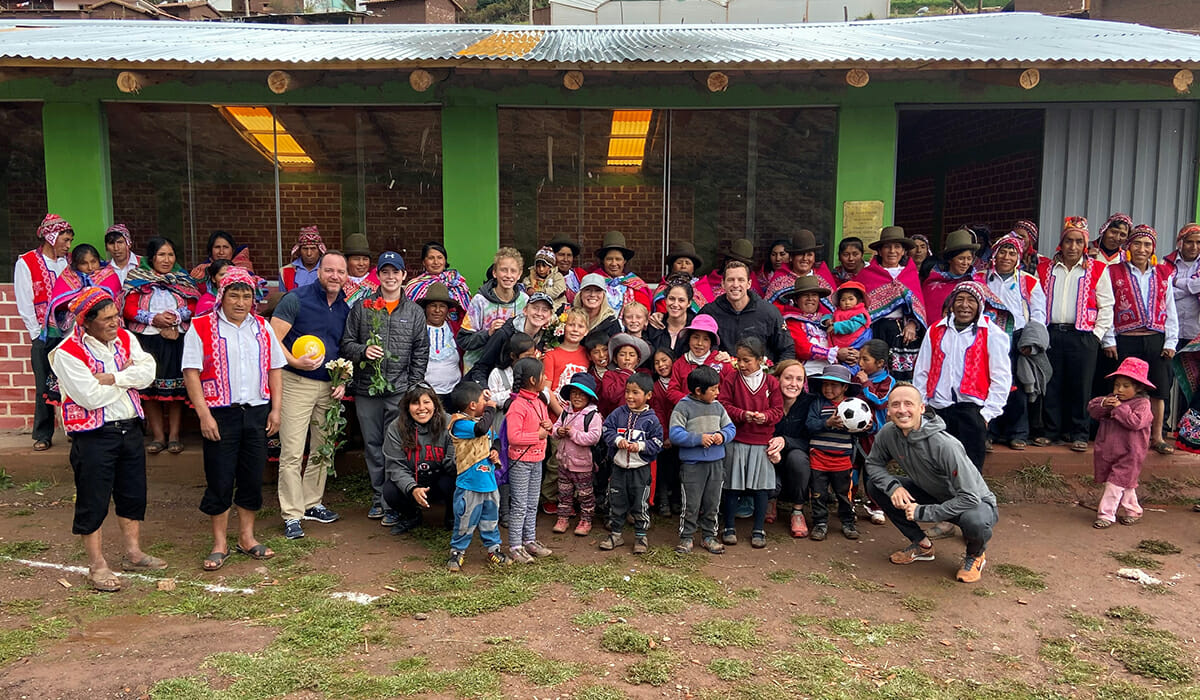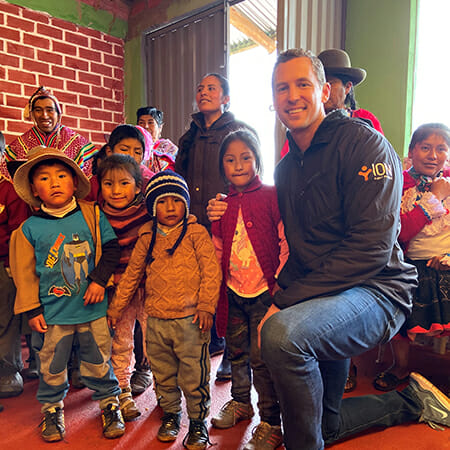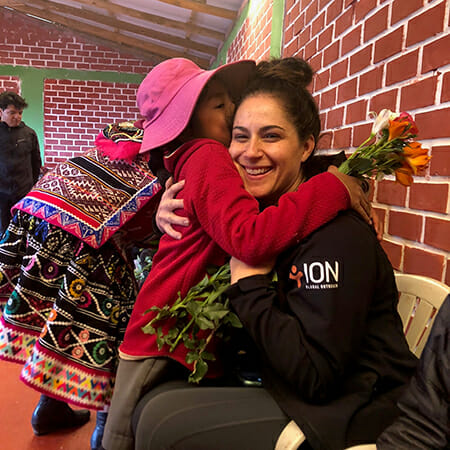Healthcare Professionals Start Nonprofit to Organize Medical Mission Trips to Underserved Communities

Meet Daily Point of Light Award honorees Shane Groover and Sarah Huovinen. Read their story and nominate an outstanding volunteer or family as a Daily Point of Light.
Billions of people, making up two-thirds of the world’s population, are living without access to safe or affordable surgery. Smyrna, Ga.-based healthcare professionals Shane Groover and Sarah Huovinen are doing what they can to help as many of these people possible, through starting their own nonprofit, Ethical Medical Missions.
Ethical Medical Missions coordinates with volunteer healthcare providers, including surgeons, nurses and technical staff, to send them on international medical mission trips that will provide free healthcare to those in need. The organization partners with existing charitable organizations, takes care of the administrative work, secures the necessary funding, and organizes device and supply donations, in order to make it seamless for interested healthcare providers to volunteer. Shane and Sarah, who are the president and vice president of Ethical Medical Missions, started the organization in August after years of working in the healthcare industry — Shane currently as the owner of a small medical device distributorship that focuses on spinal implants, and Sarah as a neurophysiologist.
Last year, they organized the nonprofit’s first trip to Peru. Along with a team of three surgeons and about fifteen other volunteers, they provided necessary spinal surgeries to about 30 locals, as well as education to the local hospital staff. They also engaged in additional humanitarian work by assisting with school-building renovations and handing out donations to the local community. Ethical Medical Missions will be returning to Peru this June, and plans on organizing another trip elsewhere before the year is over.

Describe what Ethical Medical Missions does.
Shane: We have worked in the advanced surgical healthcare industry for quite a whole now and … we’re passionate about bringing surgical and advanced healthcare to underserved communities around the globe. There’s a big need for surgeons to go on these medical mission trips in order to help out populations in underserved and impoverished communities that don’t have that access to surgery and advanced healthcare. We partner with both the health providers that go on these mission trips, and the charitable organizations that have already established mission trips in their countries. We identify the opportunities that both work for the charities and also with the healthcare providers in order to set them up with a medical mission trip that works for them. Then we take care of all the administration, funding, getting all the paperwork, finding the drug donations, partner with the hospitals to get instruments and supplies. Then we go on the mission trip with them to help provide support. Sarah does neuromonitoring. I work in the OR with these guys. We bring surgeons to foreign countries to do medical missions.
We’re not just doing medical mission trips here. We really try to focus on education as well. The whole thing is you can give a man to fish and feed him for a day, or you can teach a man how to fish and you’ll feed him for a lifetime. When we are in the countries that we’re in, we try to focus on an education piece — teaching the local surgeons, teaching the local staff, about how to deal with some of these patients that really have some advanced problems, whether it be palliative or basic surgery. We want to leave an impact that these guys can draw on, education that they can draw on once we leave, because there is still an existing problem after the five or six days we leave the country. They still have tons and tons of people who need help. If we come in there and do surgery and we leave and we don’t teach anybody how to do the same things, then we’re not making as big of an impact as we possibly can. The focus really is on teaching and education as well as providing surgery once we’re in the country.
Why did you want to start this organization?
Sarah: I had done medical mission trips these past few years through work, and I always knew I wanted to be more involved with that type of thing and do as many of them as I could. Shane came to me with the idea of starting this charity and I was all about it. I knew it was exactly what I wanted to do and with my background and his, we would be able to provide more trip options for people who want to go, and make ourselves useful.
Shane: We’ve gone on these before and we’ve seen a need. If you go on the medical mission trips, you do one or two of these and your heart is changed forever. You see some of the most impoverished people you’ll ever encounter, who don’t have access to the basic healthcare needs we’ve come to enjoy and take advantage of here in the United States. When you see that kind of stuff, it really stirs you. It’s always stuck with me since I was in the military and traveling overseas and saw it. Sarah has done medical mission trips as well. Then taking our experience, where we are in with a lot of these surgeons and advanced healthcare practitioners who really saw a need. There’s kind of a bell curve of volunteerism I see. You’ve got the guys who are all about volunteering. They want to do this, they really actively engage in some sort of organization, they’ll take the initiative in order to set their own mission trips up. Then you have the other side of the bell curve, that no matter what they do, they’re just not interested in volunteering, they’re not interested in going outside the U.S. For whatever reason, they’re just not interested in it. We’ve come to see the vast majority of surgeons are open to the idea, they’re willing to do these medical mission trips, but they don’t want to do all the administration, all the paperwork, all the finding the funding, getting donations from medical device supply companies, working with the hospitals. They’re already busy doing all of that. That’s where we kind of take over — say you want to go on this mission trip, we’re going to work with the organization to make it as efficient and as beneficial to the host country and the charity that we possibly can.
What was your last mission trip to Peru like?
Shane: It was for about a week. We did surgery for about five days and then saw the sites and did some touring after that. We were partnered with a nonprofit called Eagle Condor and also a device manufacturer called Innovasis. We were able to bring three surgeons from all over the United States. One was from Denver, one was from Salt Lake City, one was from Washington, D.C., and we teamed up in Peru. We went down to Lima, teamed up with a hospital down there, and assessed 30 patients that basically came in and — we were doing spine surgeries there — said they needed some sort of spine intervention. We worked with the three surgeons to do surgeries on these patients.

What are your goals for Ethical Medical Mission’s future?
Shane: Right now, we’re pretty new, so we’re partnering with existing organizations that have medical mission trips set up. Our ultimate goal is to set these things up ourselves and be able to provide different opportunities throughout the year for them to go as a part of Ethical Medical Missions. That’s the ultimate goal, to expand it to where we are doing all of the set up for the mission trips and doing it all ourselves. Our goal [was] to go on one last year, two this year, and then hopefully next year to go on four, and then start setting up our own medical mission trips in hopefully year three. We don’t know where our second trip is going to be. It kind of depends on the surgeon who we are partnering with. We ask them a bunch of questions on where they want to go, what organization they’re interested in, and if it depends on a time frame. Then we match the medical mission trip with what their desires are. It could be anywhere.
Is there a story from any mission trip you’ve been on that has really stayed with you?
Sarah: One of the girls we did surgery on the last time we were in Peru, she was 23 or 24, mother of two. She had scoliosis and we did a huge fusion on her back. She was just amazing. She was so thankful. We saw her up and walking two days after surgery. It completely changed her life. She was at the point where she couldn’t pick up her kids and she was just so thankful and she was walking around the hospital, and hugging us and hugging surgeons, and taking nothing but Tylenol. It was just amazing.
Shane: These people when they come into surgery, they have to bring their own postoperative medication. If they can’t afford any, then you don’t really get any unless we’re able to provide those medications, which on this trip, we really didn’t have any. The lady walked in for a huge surgery and only had Tylenol for the postoperative medication. She was as happy as she could possibly be, because she knew the surgery had taken care of the biggest portion of [her] big problem. She had some postoperative pain, but she was still smiling and loving and hugging on all of us that she was able to receive the surgery, even though she was in a great deal of pain, because we were able to provide her basically a new life where she could play with her kids.
What’s been the most rewarding part of your work?
Sarah: For me, just seeing the patients after surgery. It’s amazing how happy they are and thankful. It completely changes you.
Shane: When you go into these hospitals, there’s not a lot of hope. If they do have access to surgery, most of the people in these areas cannot afford it at all, so even if they have the access — which a lot of places don’t even have the access to surgery — they can’t afford it. Coming in to places that really do not have hope of any type of restoration or healing and being able to talk to them and really provide first-world healthcare, and giving them that hope that you know that you won’t have to live with this pain or this problem for the rest of your life, we’re going to come in and take care of you and do it in a professional manner. Then also seeing them postoperatively, and the joy and just how effective surgery can be for people who really don’t have hope.
What do you want people to learn from your story?
Shane: The biggest takeaway, I would say probably, is the education piece of it. There’s the fact that there’s five billion people out there in the world that don’t have access to surgery, and that’s about two-thirds of the world’s population. I think people in the United States do not understand how big of a problem healthcare in other countries really is. We have the ability to walk into a pharmacy or walk into an acute care place or go see our doctors, and it’s just not a reality for a majority of the world’s population. I don’t think we understand that as a collective group in some of these first-world countries. We want to bring awareness to how big of a problem not having access to adequate, advanced healthcare is.
What have you learned through your experiences as a volunteer?
Shane: I would say probably the biggest thing I’ve learned is you can make a difference if you have passion. If you have an idea or you have something that you want to see changed and you want to help improve, you really can make a difference. It doesn’t take someone else going in there and doing it for you. I think there’s a lot of people that want to do good things but don’t think they can because they don’t have the time, the resources, the initiative, anything, and really it just takes a little bit of heart and a little bit of initiative and you really can impact a lot of people’s lives.
Do you want to make a difference in your community like Shane and Sarah? Find local volunteer opportunities.
